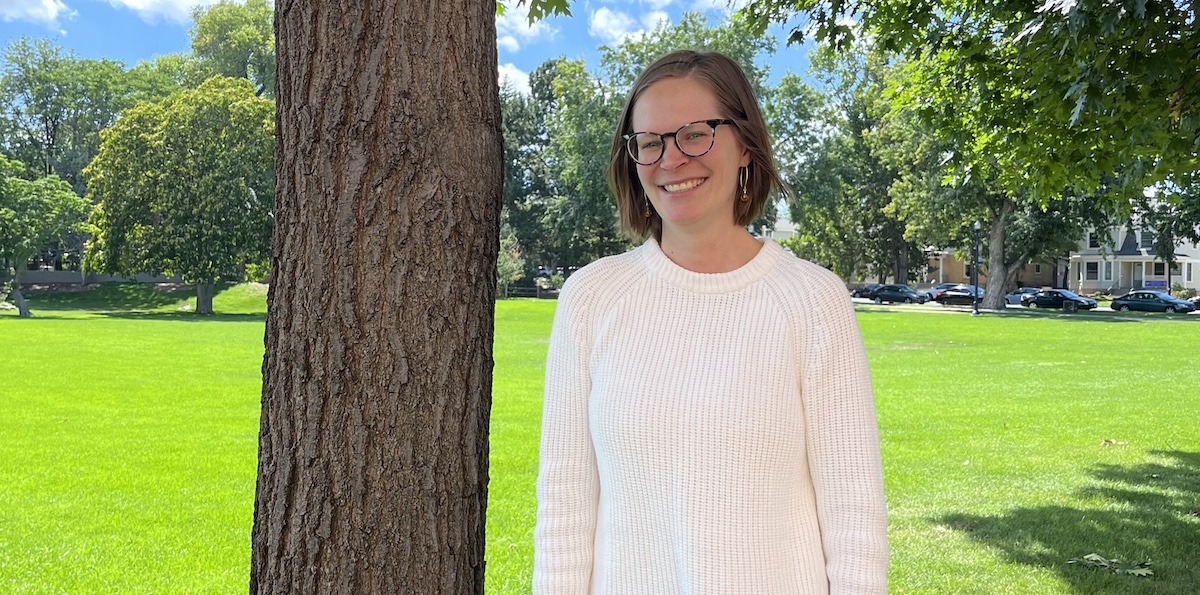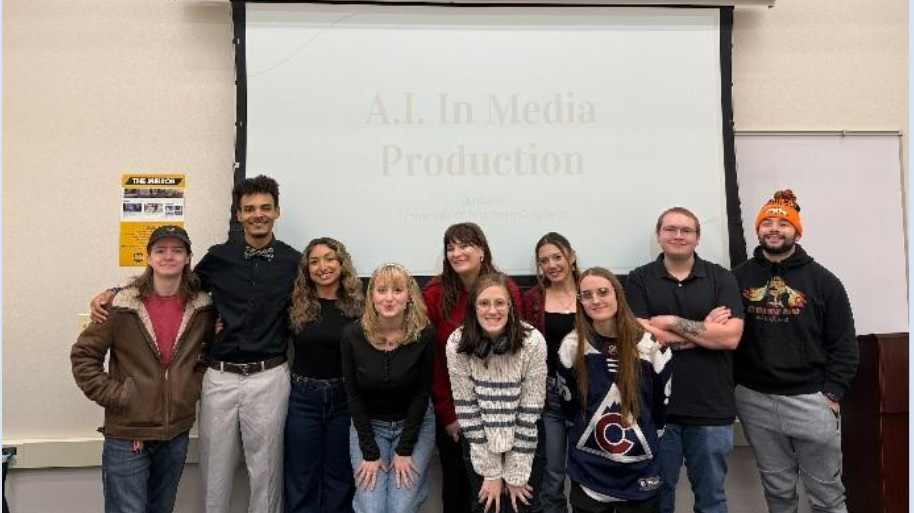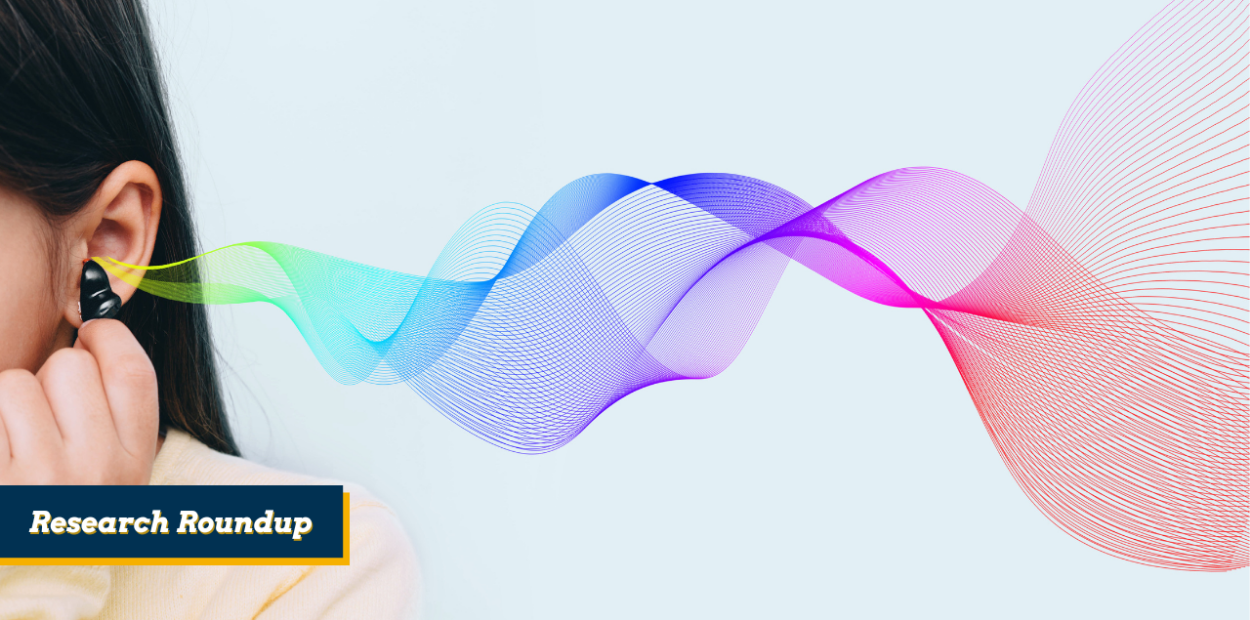
Article
September 26, 2023
Written by Student Writer Zvi Gutierrez
Inspiring Others Through Science: New Audiologist and Cognitive Neuroscientist Plans to Make Big Impact
By leveraging her expertise in audiology and cognitive neuroscience, Hannah Glick, Au.D., Ph.D., wants to help students discover their purpose and passion in science.
By leveraging her expertise in audiology and cognitive neuroscience, Hannah Glick Au.D., Ph.D., wants to help students discover their purpose and passion in science.
After earning her Doctor of Audiology, an interdisciplinary Ph.D., in the fields of speech, language and hearing sciences, cognitive science and neuroscience from the University of Colorado Boulder and working as a researcher in industry, Glick joined the University of Northern Colorado’s College of Natural and Health Sciences this fall as a professor. Her education has provided her with a solid foundation in the areas of neuroimaging, brain plasticity and cognition. She earned her bachelor’s degree in Speech, Language and Hearing Science in 2012, where she learned about people with different communication disorders. During her graduate training, Glick worked in various clinical audiology settings doing rotations through the University of Colorado Hospital, the Marion Downs Center and a private practice. She also participated in and won the 3-Minute Thesis (3MT) in 2019. 3MT is a competition where doctoral students talk about their research in a way anyone can understand, in three minutes or less. She presented her research on the brain function of adults with various stages of hearing loss and highlighted hearing aids that could help combat brain and cognitive changes.
After finishing her Ph.D., Glick worked at a cochlear implant company. She was designing the next generation of cochlear implants and new clinical tools to improve outcomes in cochlear implant recipients.
She found her path to audiology and neuroscience when a good friend’s mother received cochlear implants as an adult. Glick said that seeing the process of her friend’s mom receiving the implants was eye opening and it was amazing to see how the brain could “relearn” to hear again. The mother also worked at a hospital as a family counselor helping to coach families with infants who were born with hearing loss. Glick shadowed her doing this and decided to lean into that interest.
Glick is a clinical audiologist who helps people with hearing and balance. An audiologist’s job is to screen, diagnose and treat hearing and balance disorders for people of all ages. Audiologists help figure out what the best approach would be for a patient to use hearing technology such as hearing aids or cochlear implants. To address balance issues, audiologists assess a patient’s balance system, which includes vision, their sense of touch and their inner ear.
Glick’s other interest is neuroscience, a discipline that studies the human brain and how it works. Specifically, Glick is interested in cognitive neuroscience, an area of research that combines measurement of brain activity (mostly by means of neuroimaging) and performance on cognitive and behavioral tasks. She applied it to audiology through studying neuroscience.
“A lot of audiologists spend their days thinking about the ear, but the ear is attached to our brain, so we don’t listen and understand with our ears. We listen and understand with our brain,” Glick said. “Ears are just one piece of the puzzle when we are thinking about hearing loss.”
Glick is passionate about the work she does and is enthusiastic about sharing her research. Most of her work uses neuroimaging (brain imagining) as a way to examine the effects of hearing loss on the brain. One study she conducted examined babies with hearing loss and delved deeper into how their brain pathways develop. She also researched how early hearing intervention in babies can promote typical brain development.
Glick’s research has been supported by the National Institutes of Health and the American Speech-Language-Hearing Association and featured in publications and presentations globally.
In another study, she looked at the effects of aging and age-related hearing loss on the brain to determine how hearing loss affects cognitive function.
“The study included older people who had hearing loss and older people without hearing loss. We studied the brain and cognitive function in both groups at baseline. We then took the group of adults with hearing loss and fit them with hearing aids, and we looked at changes in their brain and cognitive function after six months of hearing aid use,” said Glick.
“We also looked at their cognitive function, so their memory and decision-making after treatment. We found that there are a lot of brain changes that happened after they were treated, and their cognitive function improved in specific areas such as their global cognitive function, processing speed and executive functioning.”
This study was one of Glick’s favorites. For participating in the study, she worked with local agencies to provide grants for the adults to purchase and keep their hearing aids after the study. Many of the participants would not have been able to afford hearing aids otherwise.According to the National Institute on Deafness and Other Communication Disorders, hearing aids aren’t generally covered by health insurance providers. And a recent article from Forbes estimates that an individual can spend anywhere from $2,000 to $8,000 for a pair depending on the technology used in the hearing aid. Next to a house and a car, hearing aids can be the third most expensive purchase for an older person.
Glick is continuing her research studying how hearing loss affects human’s overall well being. Currently, she is analyzing data she collected about depression to understand how people’s depression was either changing or improving from the time before they received hearing aids to after they received them.
One large reason Glick made the decision to come to UNC was the university’s student-centered focus on teaching and learning. Given UNC’s legacy as a teacher’s college that dates back to 1889, the university was extremely attractive to Glick, who is passionate about teaching and helping students reach their highest potential.
Glick wanted to become a professor because she believes the future of audiology and neuroscience is in the hands of students, the next generation of audiologists and scientists. Supporting students as they figure out what they are passionate about is what she loves to do. Glick wants to equip students with the critical thinking and problem-solving skills that are essential in the field of audiology as it is constantly evolving.
“Technology is changing so rapidly with AI (Artificial Intelligence). We have no idea what it’s going to look like, so I am very passionate about supporting students in their passion areas and helping them solve those unknown problems of the future,” said Glick.
With these goals in mind, she is excited to mentor and work with students who are first-generation or come from underrepresented backgrounds since these groups are underrepresented in the science community. She wants to get students excited about science and show them that they can succeed, how fun science is and how the industry can be leveraged to benefit the communities nation-wide.
“Students can go on to have really meaningful careers where they’re making a difference in the world and lives of other people,” Glick said.



